|
|
|
Sort Order |
|
|
|
Items / Page
|
|
|
|
|
|
|
| Srl | Item |
| 1 |
ID:
133970
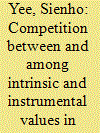

|
|
|
|
|
| Publication |
2014.
|
| Summary/Abstract |
Recently there has been a great deal of talk about visions and alternative visions of the world and the values involved in each vision.1 Obviously it is important for us to see clearly the various visions of the world. But the picture is quite murky and there is really no end to history, and there will be no conquering of one vision over another anytime soon. In the meantime, it is more important for us to be good decision-makers in any vision of the world that we find ourselves in, or choose to live in. To illustrate, if we are capitalists, we'd better be good capitalist decision-makers; if we are socialists, we'd better be good socialist decision-makers.
|
|
|
|
|
|
|
|
|
|
|
|
|
|
|
|
| 2 |
ID:
060457
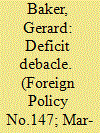

|
|
|
|
|
| Publication |
Mar-Apr 2005.
|
|
|
|
|
|
|
|
|
|
|
|
|
|
|
|
| 3 |
ID:
133810
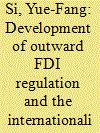

|
|
|
|
|
| Publication |
2014.
|
| Summary/Abstract |
The Investment Development Path (IDP) model has been widely accepted for illustrating the relationship between the inward and outward foreign direct investment (FDI) positions of a country and its economic status based on the data from developed economies. In recent years, however, outward FDI from developing economies has increased dramatically and it has been argued that institutions are 'forefront' factors in addition to the economic index. In this article, we use statistical data from China, which has gone through dramatic regulation reform and FDI development, to test the validity of the IDP model. We also trace the history of Chinese FDI regulation development to answer the following question: in what way are regulations important for FDI in different periods? We use Lenovo as a case study to show how a Chinese firm 'avoids' and 'adapts to' regulation changes. We find that the FDI development of China still follows the IDP model; however, the Chinese government has accelerated the whole process through active regulation reform. In a transition economy such as China, FDI co-evolves with the regulation, and the firms which can influence or foresee the policy changes can prosper considerably.
|
|
|
|
|
|
|
|
|
|
|
|
|
|
|
|
| 4 |
ID:
130977
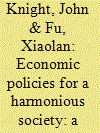

|
|
|
|
|
| Publication |
2014.
|
| Summary/Abstract |
China's remarkable economic growth has produced dramatic structural and socioeconomic change.
Economic growth has solved many problems but the accompanying changes in the economy and
society have brought new problems to the fore. This has been recognized by China's Government
in the recent emphasis that it has placed on the need to create a "harmonious society." The new
leadership will wish to devise new policies for the current challenges and those ahead
|
|
|
|
|
|
|
|
|
|
|
|
|
|
|
|
| 5 |
ID:
128318
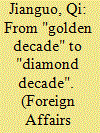

|
|
|
|
|
| Publication |
2013.
|
| Summary/Abstract |
With profound foundations and solid bonds, China-ASEAN relations boast huge cooperation potentials, broad prospect and vigorous stamina. In 2013, the Chinese government set forth a cooperation framework of "two consensus and seven cooperation areas" for the next decade of China-ASEAN relations. This is a policy proclamation of the new Chinese government on the development of China-ASEAN relations in the forthcoming decade and has received active response from leaders of ASEAN countries.
|
|
|
|
|
|
|
|
|
|
|
|
|
|
|
|
| 6 |
ID:
133809
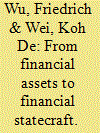

|
|
|
|
|
| Publication |
2014.
|
| Summary/Abstract |
Over the past few decades, China has accumulated over US$3.4 trillion of official foreign exchange reserves as it rises to become a global power. Do China's financial assets increase its ability to pursue its national interests internationally? With the globalisation and rising influence of Chinese state-owned enterprises, state-owned banks and sovereign wealth fund, as well as China's growing clout in several regional groupings, it is clear that China does possess the necessary mechanisms to assert its financial power. This article examines the efficacy and limitations of these mechanisms in Africa and Latin America, in the economic and political domains. In the economic domain, China has consistently used foreign oil contracts and acquisitions to secure direct oil flow from developing nations. An analysis of recent cases shows that while China is able to successfully harness its financial power in its pursuit of oil, it needs to fulfil its promises to the satisfaction of the recipient countries in order to maintain the value of its offers. In the political domain, China has used its financial assets to purchase diplomatic allegiance from various African and Latin American countries in support of its One-China policy. Studying both successful and unsuccessful cases reveals that while China is generally able to use its financial power in third-world countries against Taiwan successfully, its national goals have, in recent years, shifted to the economic realm, even with countries that still recognise the Taipei government.
|
|
|
|
|
|
|
|
|
|
|
|
|
|
|
|
| 7 |
ID:
135186
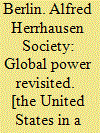

|
|
|
|
|
| Publication |
Berlin, Foresight, 2009.
|
| Description |
51p.Pbk
|
|
|
|
|
|
|
|
|
|
|
|
Copies: C:1/I:0,R:0,Q:0
Circulation
| Accession# | Call# | Current Location | Status | Policy | Location |
| 058016 | 333.0973/BER 058016 | Main | On Shelf | General | |
|
|
|
|
| 8 |
ID:
129653
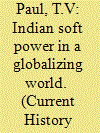

|
|
|
|
|
| Publication |
2014.
|
| Summary/Abstract |
Soft power-based on intangible indicators such as culture, civilization, literature, philosophy, involvement in global institutions, diplomacy, political organization, and state capacity-has emerged as an important factor in the globalizing world for nations seeking higher status and influence. But an appraisal of India's present and putative soft power assets underscores the need for greater hard power resources in order to harness soft power more effectively. Indeed, soft power without hard power is a chimera, and they should not be seen in oppositional terms, especially for an aspiring global power. Hard power sources include military, economic, demographic, and technological assets. As defined by Harvard's Joseph S. Nye Jr. in his 2004 book Soft Power: The Means to Success in World Politics, soft power "is the ability to get what you want through attraction rather than coercion or payments. It arises from the attractiveness of a country's culture, political ideals, and policies. When our policies are seen as legitimate in the eyes of others, our soft power is enhanced." Yet a country relying solely on soft power without hard power assets can find its weaknesses exposed easily. This happened to India in 1962, when China inflicted a humiliating military defeat on it, tarnishing New Delhi's hard-won soft power position in the world, especially among other de.
|
|
|
|
|
|
|
|
|
|
|
|
|
|
|
|
| 9 |
ID:
133669
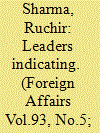

|
|
|
|
|
| Publication |
2014.
|
| Summary/Abstract |
Global investors usually focus on economic data such as GDP growth, employment, and trade. But in today's trying economic climate, they have started to train their gaze elsewhere: on national political leadership and the prospects for reform.
|
|
|
|
|
|
|
|
|
|
|
|
|
|
|
|
| 10 |
ID:
124849
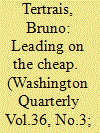

|
|
|
|
|
| Publication |
2013.
|
| Summary/Abstract |
Who would have predicted just two years ago that cash-strapped, inwardly-focused, soul-searching France would embark on a flurry of military operations and bold strategic moves? How France can really afford to remain a global power while imposing some of the heaviest budget cuts ever.
|
|
|
|
|
|
|
|
|
|
|
|
|
|
|
|
| 11 |
ID:
132884
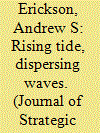

|
|
|
|
|
| Publication |
2014.
|
| Summary/Abstract |
This article surveys China's current naval forces and considers key dynamics and possible Chinese naval futures to 2020, the projected end of Beijing's 'strategic window of opportunity', the idea that a peaceful external environment for economic development, globalization, and integration of China into the global economy allows China to benefit from diversion of US attention to countering terrorism. It considers broad possibilities through 2030, the general limit of public US government projections, and by which time multiple factors will likely slow China's growth and compete for leadership focus and resources.
|
|
|
|
|
|
|
|
|
|
|
|
|
|
|
|
| 12 |
ID:
128257
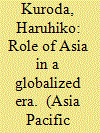

|
|
|
|
|
| Publication |
2013.
|
| Summary/Abstract |
This article first reviews the past 25 years, during which the international political situation as well as international economics and finance underwent major structural changes. It then focuses on Asia, which has recorded remarkable growth and strengthened its financial architecture since the Asian currency crisis. Issues facing Asia are detailed, together with recommendations for Asia's participation in a new international economic order.
|
|
|
|
|
|
|
|
|
|
|
|
|
|
|
|
| 13 |
ID:
132127
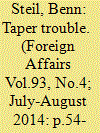

|
|
|
|
|
| Publication |
2014.
|
| Summary/Abstract |
In April 2013, Ukraine was sporting a massive current account deficit of eight percent, and it badly needed dollars to pay for vital imports. Yet on April 10, President Viktor Yanukovych's government rejected terms set by the International Monetary Fund (IMF) for a $15 billion financial assistance package, choosing instead to continue financing the gap between its domestic production and its much higher consumption by borrowing dollars privately from abroad. So a week later, Kiev issued a ten-year, $1.25 billion eurobond, which cash-flush foreign investors gobbled up at a 7.5 percent yield.
|
|
|
|
|
|
|
|
|
|
|
|
|
|
|
|
|
|
|
|
|